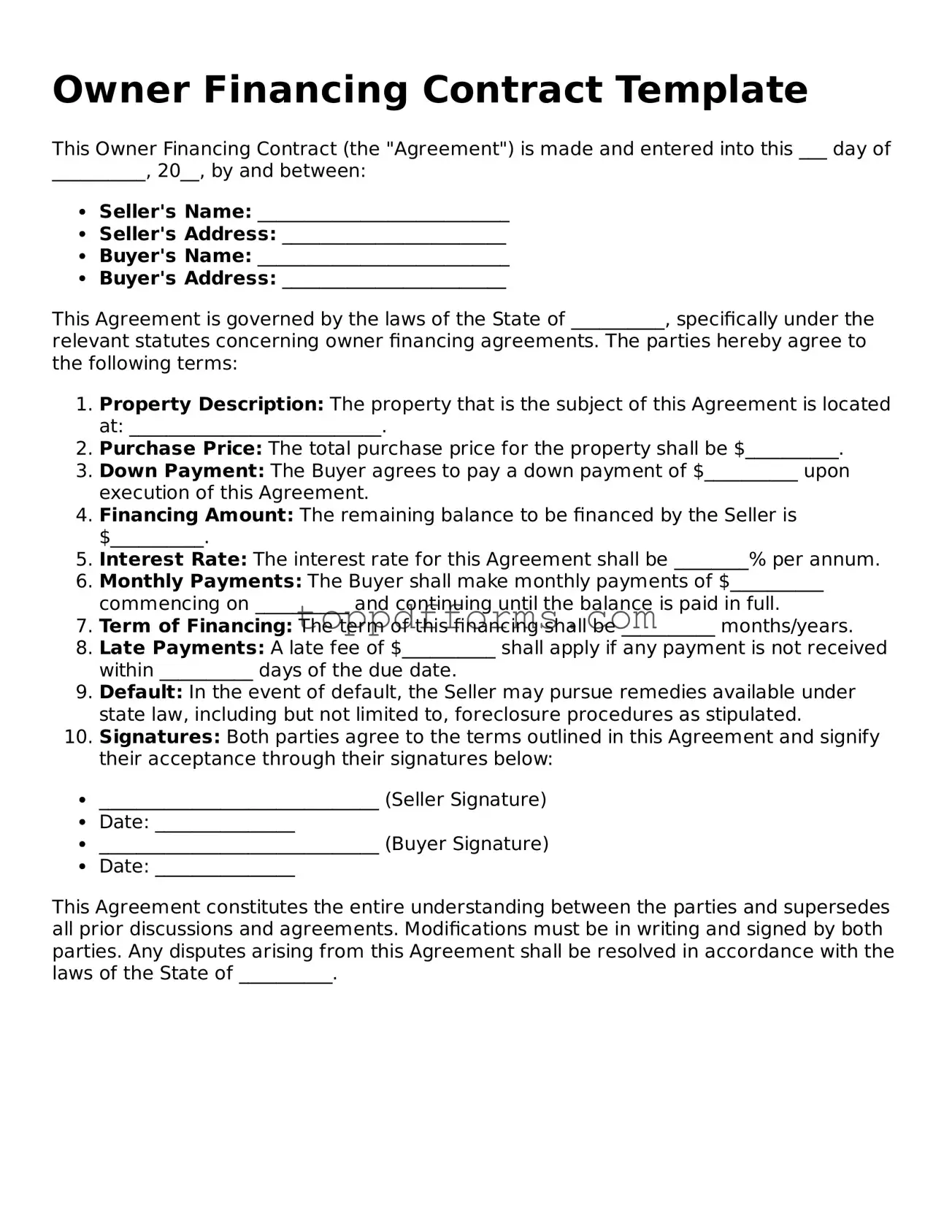Free Owner Financing Contract Template
Things You Should Know About This Form
What is an Owner Financing Contract?
An Owner Financing Contract is a legal agreement between a seller and a buyer where the seller provides financing to the buyer to purchase a property. Instead of going through a traditional lender, the buyer makes payments directly to the seller over time. This arrangement can benefit both parties by facilitating a sale when traditional financing is not an option for the buyer.
What are the benefits of using an Owner Financing Contract?
Owner financing can offer several advantages. For buyers, it may provide easier access to financing, especially if they have poor credit or limited funds for a down payment. Sellers can benefit from a quicker sale and potentially earn interest on the financed amount. Additionally, it allows sellers to set terms that may be more favorable than those offered by banks.
What terms should be included in the Owner Financing Contract?
Key terms to include in the contract are the purchase price, down payment amount, interest rate, payment schedule, and duration of the loan. It's also important to outline responsibilities for property taxes, insurance, and maintenance. Clearly defining these terms helps prevent misunderstandings and protects both parties' interests.
Is a down payment required in an Owner Financing Contract?
While a down payment is not always required, it is common practice. A down payment can help demonstrate the buyer's commitment and reduce the seller's risk. The amount can vary based on the agreement between the buyer and seller, but typically ranges from 5% to 20% of the purchase price.
Can an Owner Financing Contract be modified after it is signed?
Yes, an Owner Financing Contract can be modified if both parties agree to the changes. It is essential to document any modifications in writing to ensure clarity and enforceability. Changes may include adjustments to payment terms, interest rates, or other relevant details.
What happens if the buyer defaults on the contract?
If the buyer defaults, the seller typically has the right to take back the property through a process called foreclosure. The specific steps and consequences of default should be clearly outlined in the contract. It is crucial for both parties to understand their rights and obligations in the event of a default.
Is legal assistance necessary when creating an Owner Financing Contract?
While it is not legally required to have an attorney draft an Owner Financing Contract, seeking legal assistance is highly recommended. An attorney can ensure that the contract complies with local laws, protects your interests, and addresses any specific concerns. This can help avoid potential disputes in the future.
PDF Overview
| Fact Name | Description |
|---|---|
| Definition | An Owner Financing Contract allows a buyer to purchase property directly from the seller without a traditional mortgage lender. |
| Payment Terms | The contract outlines the payment schedule, including the down payment, interest rate, and the duration of the loan. |
| Governing Law | In the United States, owner financing contracts are typically governed by state laws, which may vary significantly. For example, in California, the relevant laws include the California Civil Code Sections 2981-2984. |
| Benefits | This type of financing can be beneficial for buyers with poor credit or for sellers looking to sell quickly, as it bypasses traditional lending processes. |
Common mistakes
Filling out an Owner Financing Contract form can be tricky. Many people make mistakes that can lead to confusion or even legal issues later on. One common mistake is not providing accurate information about the property. It’s essential to include the correct address, legal description, and any other identifying details. Without this information, it can be difficult to enforce the contract.
Another frequent error involves the terms of the financing. Some individuals overlook details such as the interest rate, payment schedule, and loan duration. These terms should be clear and specific. Vague language can create misunderstandings between the buyer and seller, which can lead to disputes down the road.
People also often forget to include necessary contingencies. For instance, a buyer might want to include a clause that allows them to back out of the deal if they cannot secure financing through traditional means. Omitting these contingencies can leave one party vulnerable if circumstances change.
Finally, signatures are crucial. Some people neglect to have all necessary parties sign the contract. This oversight can render the agreement unenforceable. It’s important to ensure that everyone involved in the transaction has signed and dated the document to make it legally binding.
Different Types of Owner Financing Contract Templates:
Purchase Agreement Addendum - This addendum is useful for responding to market changes affecting the deal.
Before finalizing any transactions, it is essential to gather all necessary documents, including the Minnesota PDF Forms, to ensure a clear understanding of the terms of the sale, which can help avoid any future disputes or miscommunications.
